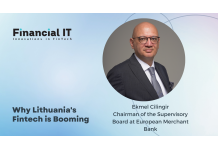The Commonwealth of Fintechs: Key Lessons to be Learned

- Hilary Smyth-Allen, BPFS Sector & Modern Services Lead at Greater Birmingham & Solihull Local Enterprise Partnership
- 15.07.2022 10:45 am #fintech
The UK created a record 29 unicorns in 2021 - surpassing the number created by France and Germany combined - providing a total of 115 unicorns (the name used for tech companies worth at least $1 billion). This is handy given that the UK has set its sights on becoming a tech superpower. The only way this can be achieved, however, is by blending the UK’s excellent homegrown talent with undeniably phenomenal skills from across the world. It is the associated cultural and behavioural differences that are considered fundamental to contributing to the melting pot of talent that the UK needs to become a tech superpower.
Given that the UK is a member of The Commonwealth (which this summer is highlighted by the 2022 Commonwealth Games being held in Birmingham), it is only natural that a huge amount of talent has been relocated from a number of Commonwealth countries through the UK’s Global Talent visa. In an effort to learn from each other, this article highlights some key learnings from my discussions with various fintech leaders across a number of countries represented in the Commonwealth.
South Africa, for example, is a fintech hive at the moment. The fintech ecosystem there is supported by the Fintech Association of South Africa, whose aim is to create a conducive environment to stimulate innovation in the sector by increasing access, transparency and having a voice with regulators. It is particularly important to the association that the diverse community across South Africa is brought together to conduct an open dialogue in support of the next phase in fintech, as well as create a unified voice for the country’s ecosystem while ensuring all stakeholders have an equal weighting within that environment. According to Lavina Ramkissoon, co-founder and vice chair of the FinTech Association of South Africa, one area of development is focused on dealing with the very large unbanked market. Along with mobile banking, the open banking and open financing movements that exist under the umbrella of fintech are offering opportunities to onboard many people that have previously missed out. There are also opportunities for creating interoperable financial data that can be connected with an individual’s financial identity in an effort to empower digital citizens to securely and transparently transact their digital identities through numerous platforms, without having to log on to multiple platforms.
African-based solutions that have been brought to the UK include Social Lender, a Lagos-based fintech that helps newcomers to countries by providing a social media reputation scoring for credit and financing solutions. Inversely, UK-based companies are also expanding into other Commonwealth countries. CrowdProperty is a Fintech and Proptech company based in Birmingham that has recently expanded into Australia. Its vision is to put technology and automation into every single aspect of its business and customer delivery, except for those that need sophisticated expertise and human interpretation to make ultimate decisions in property development lending. For this, local operations and local people are absolutely paramount to unlocking faster scalability in new markets, especially when combined with technology development based out of its office in Birmingham.
Working across different countries can throw up some bumps and barriers along the way, however. Cultural intelligence, for example in terms of how to properly address people, is something that needs to be acquired rather than learnt. Likewise, gaps in IT skill sets across different regions within a country can often occur - an issue that needs to be addressed across the whole of the Commonwealth. The positives are nonetheless undeniable for Voilo, Birmingham-based payments and promotional platform for sole traders, small businesses and charities, that has outsourced its entire product development process to Delhi. Voilo benefits from the UK-based operational marketing team bridging the gap with the Indian development team around knowledge of open banking, a concept that is relatively new in India.
These are just some examples of the benefits of diversity propelling the fintech companies of the Commonwealth forward. It is important to note that this diversity can be achieved by fintechs who are not only working across continents but from different regions within a country as well. The future of the UK as a fintech superpower looks bright indeed.


























